UNITED NATIONS: Be realistic. Show patience. Engage. And above all, don’t isolate. Those are the pillars of an approach emerging in Pakistan to deal with the fledgling government that is suddenly running the country next door once again — Afghanistan’s resurgent, often-volatile Taliban.
Pakistan’s government is proposing that the international community develop a road map that leads to diplomatic recognition of the Taliban — with incentives if they fulfill its requirements — and then sit down face to face and talk it out with the militia’s leaders.
Pakistani Foreign Minister Shah Mehmood Qureshi outlined the idea Wednesday in an interview with The Associated Press on the sidelines of the UN General Assembly’s meeting of world leaders.
“If they live up to those expectations, they would make it easier for themselves, they will get acceptability, which is required for recognition,” Qureshi told the AP. “At the same time, the international community has to realize: What’s the alternative? What are the options? This is the reality, and can they turn away from this reality?”
He said Pakistan “is in sync with the international community” in wanting to see a peaceful, stable Afghanistan with no space for terrorist elements to increase their foothold, and for the Taliban to ensure “that Afghan soil is never used again against any country.”
“But we are saying, be more realistic in your approach,” Qureshi said. “Try an innovative way of engaging with them. The way that they were being dealt with has not worked.”
Expectations from the Taliban leadership could include an inclusive government and assurances for human rights, especially for women and girls, Qureshi said. In turn, he said, the Afghan government might be motivated by receiving development, economic and reconstruction aid to help recover from decades of war.
He urged the United States, the International Monetary Fund and other countries that have frozen Afghan government funds to immediately release the money so it can be used “for promoting normalcy in Afghanistan.” And he pledged that Pakistan is ready to play a “constructive, positive” role in opening communications channels with the Taliban because it, too, benefits from peace and stability.
This is the second time that the Taliban, who adhere to a strict version of Islam, have ruled Afghanistan. The first time, from 1996 to 2001, ended when they were ousted by a US-led coalition after the 9/11 attacks, which were directed by Osama bin Laden from Afghanistan.
During that rule, Taliban leaders and police barred girls from school and prohibited women from working outside the home or leaving it without a male escort. After they were overthrown, Afghan women still faced challenges in the male-dominated society but increasingly stepped into powerful positions in government and numerous fields.
But when the US withdrew its military from Afghanistan last month, the government collapsed and a new generation of the Taliban resurged, taking over almost immediately. In the weeks since, many countries have expressed disappointment that the Taliban’s interim government is not inclusive as its spokesman had promised.
While the new government has allowed young girls to attend school, it has not yet allowed older girls to return to secondary school, and most women to return to work despite a promise in April that women “can serve their society in the education, business, health and social fields while maintaining correct Islamic hijab.”
Pakistan, which shares a long border with Afghanistan, has a long and sometimes conflicted relationship with its neighbor that includes attempts to prevent terrorism there and, some say, also encouraging it, which Islamabad denies. The Islamabad government has a fundamental vested interest in ensuring that whatever the new Afghanistan offers, it is not a threat to Pakistan.
That, Qureshi says, requires a steady and calibrated approach.
“It has to be a realistic assessment, a pragmatic view on both sides, and that will set the tone for recognition eventually,” the Pakistani minister said. The good news, he said: The Taliban are listening, “and they are not insensitive to what is being said by neighbors and the international community.”
How does he know they’re listening? He says the interim government, drawn mostly from Afghanistan’s dominant Pashtun ethnic group, made some additions on Tuesday. It added representatives from the country’s ethnic minorities — Tajiks, Uzbeks and Hazaras, who are Shiite Muslims in the majority Sunni Muslim country.
“Yes, there are no women yet,” Qureshi said. “But let us let the situation evolve.”
He stressed that the Taliban must make decisions in coming days and weeks that will enhance their acceptability.
“What the international community can do, in my view, is sit together and work out a roadmap,” Qureshi said. “And if they fulfill those expectations, this is what the international community can do to help them stabilize their economy. This is the humanitarian assistance that can be provided. This is how they can help rebuild Afghanistan, reconstruction and so on and so forth.”
He added: “With this roadmap ahead, I think an international engagement can be more productive.”
On Wednesday night, UN Secretary-General Antonio Guterres said after a meeting of the five permanent members of the UN Security Council that all five nations — the United States, China, Britain, Russia and France — want “an Afghanistan at peace, stable, where humanitarian aid can be distributed without problems or discrimination.”
He also described a hoped-for “Afghanistan where the rights of women and girls are respected, an Afghanistan that won’t be a sanctuary for terrorism, an Afghanistan where we have an inclusive government representing the different sectors of the population.”
Qureshi said there are different forums where the international community can work out the best way to approach the situation. In the meantime, he asserted, things seem to be stabilizing. Less than six weeks after the Taliban seized power on Aug. 15, he said, Pakistan has received information that the law-and-order situation has improved, fighting has stopped and many internally displaced Afghans are going home.
“That’s a positive sign,” Qureshi said.
He said Pakistan hasn’t seen a new influx of Afghan refugees — a sensitive issue for Pakistanis, who are highly motivated to prevent it. A humanitarian crisis, a foundering economy and workers who return to jobs and school but aren’t getting salaries and don’t have money could cause Afghans to flee across the porous border into Pakistan, which has suffered economically from such arrivals over decades of conflict.
Qureshi prescribed patience and realism. After all, he says, every previous attempt to stabilize Afghanistan has failed, so don’t expect new efforts to produce immediate success with the Taliban. If the United States and its allies “could not convince them or eliminate them in two decades, how will you do it in the next two months or the next two years?” he wondered.
Asked whether he had a prediction of what Afghanistan might be like in six months, Qureshi turned the question back on his AP interviewer, replying: “Can you guarantee me US behavior over the next six months?”
Pakistan says international community can’t ‘turn away’ from reality of Afghan Taliban
https://arab.news/p7z7v
Pakistan says international community can’t ‘turn away’ from reality of Afghan Taliban
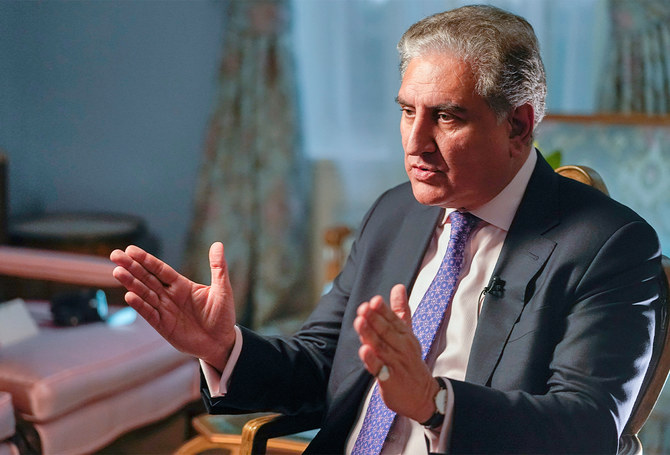
- Pakistan’s government is proposing global powers develop a road map that leads to diplomatic recognition of Taliban
- Expectations from Taliban include an inclusive government and assurances for human rights, especially for women and girls
Surging street crimes drive fear, misery into hearts of residents of Pakistan’s largest city

- According to media tallies, at least 62 people killed in incidents of street crime in Karachi this year
- Sindh Inspector General says new measures to prosecute criminals have led to higher convictions
KARACHI: With the aroma of Eid dinner still lingering in the air, Syed Turrab Hussain Zahedy left his apartment with a friend earlier this month to withdraw cash from an ATM near his roadside apartment in the teeming city of Karachi.
The muggers hit soon after they stepped out of the building and demanded they hand over their valuables. While his friend complied, Zahedy, 38, resisted and within minutes was shot dead, one among over 60 people who have been killed in attempted muggings and other incidents of street crime this year in Pakistan’s largest city and commercial hub.
Karachi, a metropolis of 20 million that hosts the stock exchange and central bank, has for decades been beset by armed violence. While an armed campaign by the military, with help from police, paramilitary Rangers and intelligence agencies, against armed gangs and suspected militants in the city brought down murder rates after 2013, street crimes have been on the rise again since last year, with shooting deaths in muggings and robberies once again becoming a daily headline.
The government in Pakistan’s southern Sindh province, of which Karachi is the capital, said last week it was intensifying efforts against street crimes but the families of victims remain hopeless, saying their loved ones have become mere statistics.
“My son, in the eyes of this government, was nothing but a moving insect,” Syed Nisar Hussain, Zahedy’s 75-year-old father, told Arab News. “He wasn’t considered a human being.”
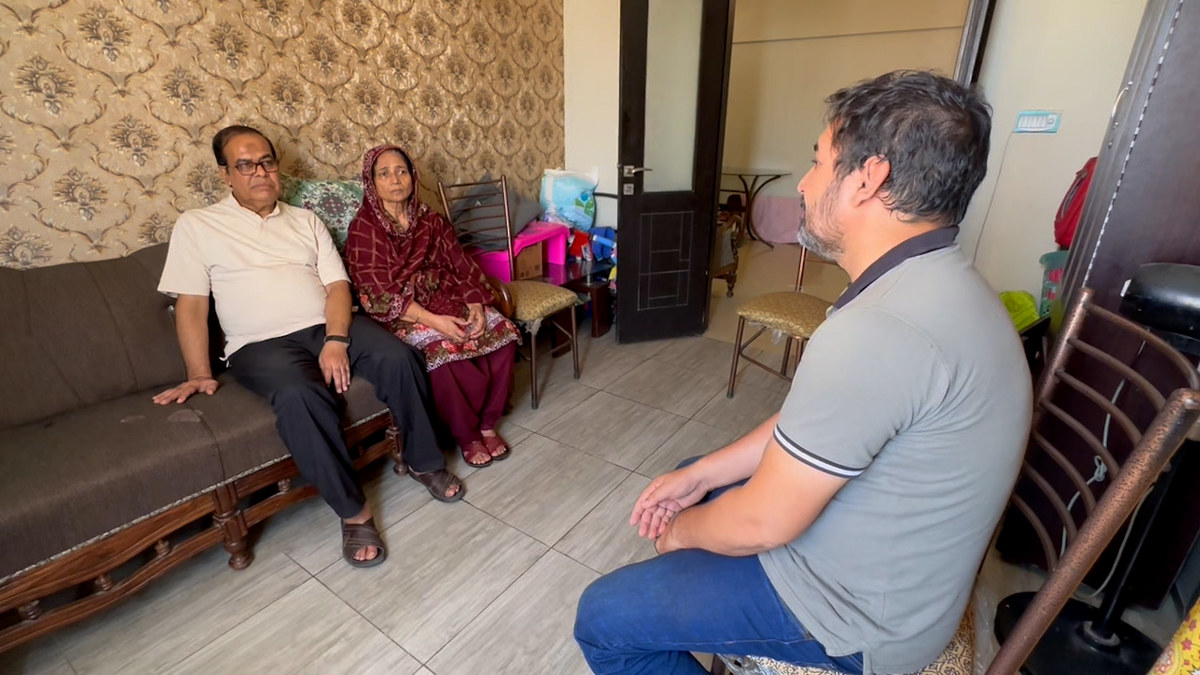
Hussain urged Pakistan’s prime minister, chief justice and army chief to step in to tackle the “terrorists” who were killing people on Karachi’s streets and lamented the criminal justice system in Pakistan where the conviction rate is very low, 11 percent, and where the failure of prosecutors to attain convictions in major as well as routine cases has badly eroded public confidence in the state’s ability to govern.
But Ghulam Nabi Memon, the inspector general of Sindh Police, said the force was now working overtime to wipe out crime, while acknowledging past neglect and mistakes.
“We have tasked good investigators to investigate cases of street crimes,” Memon told Arab News. “Additionally, we have requested the government to give us prosecutors who may help investigators in the collection of evidence.”
He said police had announced rewards and incentives for investigation officers who prosecuted cases successfully, saying such measures had already boosted the conviction rate in Karachi from less than 10 percent to 24 percent, the highest in Pakistan.
“While we are working hard to stop these killing ... overall, the incidents of crimes have decreased, which shows that police is doing its job,” Memon added.
But many Karachi residents say the feeling of insecurity has only grown.
Abdul Rahim Gul, 50, who works in the real estate business, said frequent mobile phone and car snatchings near his home and office had forced him to hire guards from a private security company six months ago.
“We have installed CCTV cameras and hired guards,” Gul lamented. “We can’t afford it but we have to do it.”
Sayida Rikshenda Jabeen, Zahedy’s 67-year-old mother, still does not know how to cope with the killing of her son, who is survived by his parents, a wife and three children between the ages of six months and six years.
“Just now, my little granddaughter was asking, ‘Grandma, where is Papa?’ What should I tell her?” Jabeen asked.
The sounds of ambulance sirens outside the Zahedys roadside apartment had also become a daily reminder of the “horrors” that lurked on the streets outside.
Scrolling through photos of her son on a cell phone, Jabeen asked the police, government and criminals:
“How many mothers’ hearts will you break? How many mothers’ laps will you people destroy?”
Pakistan says over 65,000 Hajj pilgrims to utilize Makkah Route Initiative this year
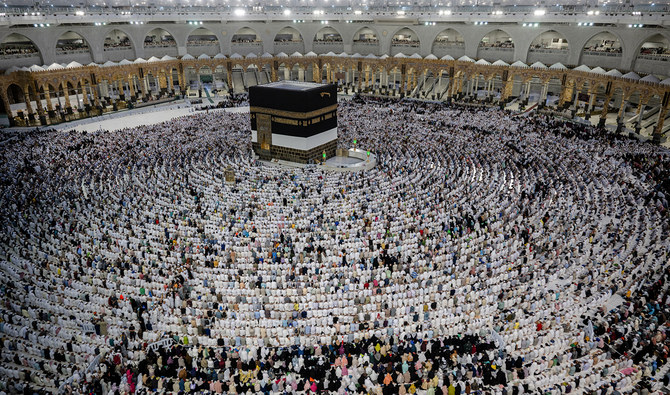
- Pakistani officials confirmed last week Saudi Arabia had extended Makkah Route Initiative to Karachi as well
- Pakistan’s religious affairs secretary says government has reduced Hajj expenses by $358.76 this year
ISLAMABAD: Over 65,000 Pakistani pilgrims are set to avail Saudi Arabia’s Makkah Route Initiative during this year’s Hajj pilgrimage, Pakistan’s religious affairs secretary said on Monday, compared to the 26,000 pilgrims who availed the facility from Pakistan’s capital in 2023.
Pakistani officials confirmed last week that Saudi authorities have approved the Makkah Route Initiative’s expansion to the airport in Karachi, the country’s largest city by population. Launched in 2019, the initiative was initially only extended to the airport in Islamabad. The Makkah Route Initiative allows for the completion of immigration procedures at the pilgrims’ country of departure, making it possible to bypass long immigration and customs checks upon reaching Saudi Arabia. The facility significantly reduces the waiting time and makes the entry process smoother and faster.
Islamabad had been requesting the Saudi authorities to extend the facility to other airports in the country as well.
“A total of 65,000 Hajj pilgrims will utilize the Route to Makkah facility at Karachi and Islamabad airports this year,” Dr. Syed Atta ur Rehman, Pakistan’s religious affairs secretary told reporters in a media briefing. Breaking down the numbers, Rehman said 41,000 of the 65,000 pilgrims will avail the facility under the government’s Hajj scheme while the remaining 24,000 will use private tour operators.
“Specifically 29,500 pilgrims will use this facility from Islamabad while 35,500 will do so from Karachi airport,” Rehman explained, thanking the Saudi government for expanding the initiative to Karachi.
Saudi Arabia last year restored Pakistan’s pre-pandemic Hajj quota of 179,210 pilgrims and abolished the upper age limit of 65 years. More than 81,000 Pakistani pilgrims performed Hajj under the government scheme in 2023 while the rest used private tour operators.
Pakistan will commence the Hajj 2024 operations from May 9 in eight airports across the country till June 9. This year’s pilgrimage is expected to take place from June 14 to June 19.
Providing details of the Hajj operations this year, the official said a total of 69,000 pilgrims will perform the pilgrimage under the government scheme. Of these, 64,000 pilgrims will perform under the general scheme while over 5,000 will perform the pilgrimage under the sponsorship scheme.
The sponsorship Hajj scheme was introduced by the government last year, allowing overseas Pakistanis to apply for the pilgrimage or sponsor someone in Pakistan for the journey by paying in US dollars. In return, applicants would not have to participate in the balloting process for the pilgrimage.
Rehman said the remaining number of pilgrims will perform Hajj on the private scheme. However, he added their exact number is yet to be determined as bookings for the pilgrimage are still underway.
This year, he said, preparations for the Hajj commenced earlier as per the Saudi government’s requirements. This helped the government secure favorable accommodations for Pakistani pilgrims in the holy cities of Makkah, Madinah, and Mina, Rehman said.
Despite the surge in inflation globally, Rehman said the Pakistani government has reduced Hajj expenses by Rs100,000 ($358.76) compared to last year.
“Last year, the government charged Rs1,155,000 ($4,143) from the south zone and Rs1,175,000 ($4,215) from the north zone, whereas this year it is Rs1,055,000 ($3,784) and Rs1,075,000 ($3,856), respectively,” he said. He added the government has reduced the cost of plane tickets from last year, bringing it down to between Rs15,000-35,000 [$53.81-$125.57].
Under the government Hajj scheme this year, the secretary said pilgrims can opt for a shorter Hajj pilgrimage but will need to pay an extra fee of up to Rs60,000 [$215.26] for it.
“In addition to the usual 38 to 42-day Hajj duration, we have introduced the option of Hajj for 20 to 25 days,” Rehman explained, adding that pilgrims can also choose exclusive options such as staying in a single room with family members or fewer people by paying an additional amount.
PCB proposes Karachi, Lahore and Rawalpindi as ICC Champions Trophy 2025 venues— report
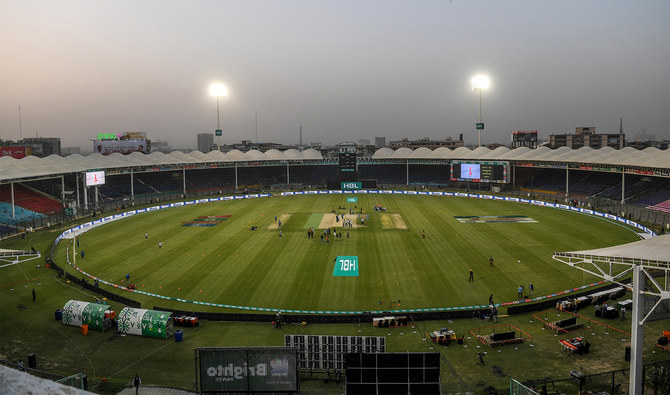
- Pakistan are scheduled to host the eight-team ICC Champions Trophy tournament next year
- PCB chairman says upgrading existing stadiums before tournament will be a “very tough test”
ISLAMABAD: The Pakistan Cricket Board (PCB) has proposed Karachi, Lahore and Rawalpindi as the three venues for the upcoming ICC Champions Trophy 2025, in an initial draft schedule of the tournament that it shared recently with the International Cricket Council (ICC), sports website ESPNcricinfo reported on Sunday.
Pakistan are scheduled to host the eight-team Champions Trophy tournament next year. If the tournament takes place in the South Asian country, it would mark the first time in nearly 30 years that an ICC event would be held in the country.
The green shirts won the last edition of the Champions Trophy 2025, which was held in 2017 in England. Champions Trophy 2017 was thought to be the last edition of the tournament until the ICC brought it back in the new rights cycle (2023-2027) and awarded Pakistan the hosting rights for the 2025 edition.
“Lahore, Karachi and Rawalpindi are the three venues proposed by the PCB in the initial draft schedule of the 2025 Champions Trophy, sent recently to the ICC,” ESPNcricinfo reported. “The eight-team tournament is expected to be played over two weeks, though the exact dates are not known yet,” it added.
It said the Pakistan board sent the initial draft after an ICC sent a team to conduct recces for the tournament. PCB Chairman Mohsin Naqvi confirmed the development during a news conference in Lahore on Sunday.
“The ICC’s security team came and we had a very good meeting,” Naqvi said. “They looked at arrangements here and we’ll also share stadium upgrade plans with them. We’re continuously in touch with the ICC. We are trying to ensure we host a very good tournament in Pakistan.”
A huge question mark looms over India’s prospects of touring Pakistan for the tournament. Political tensions between the two nuclear-armed nations mean they rarely play bilateral cricket against each other. India and Pakistan, fierce cricket rivals, meet each other on the field only during ICC tournaments and that too, at neutral venues.
India last toured Pakistan during the 2008 Asia Cup. Last year, the PCB had to adopt a “hybrid model” while hosting the Asia Cup, whereby some games were played in Pakistan but all of India’s games and the final were held in Sri Lanka.
Another challenge on Pakistan’s hands would be to upgrade its existing stadiums in line with international standards, something Naqvi has had his eye on ever since he assumed the PCB chairman’s post this year.
“If you look at Qaddafi [stadium in Lahore], it is good, but the viewing experience is not great for cricket. Football maybe, not cricket,” he said. Naqvi said Pakistan needed to improve facilities in the stadiums, especially the National Stadium in Karachi.
“So on May 7th, we’ll finalize bids from international companies who will come and help us design,” he said. “We will work with local consultants as well. We are already late but we need to do these upgrades in four-five months. It will be a very tough test but we can do it.”
Pakistani PM to address closing plenary of WEF special meeting, meet Saudi ministers today
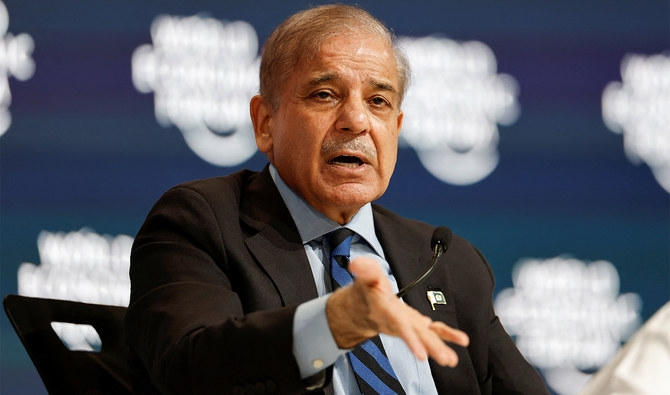
- Shehbaz Sharif met Saudi crown prince Mohammed bin Salman on Sunday and discussed bilateral ties and war in Gaza
- WEF has convened Special Meeting on Global Collaboration, Growth and Energy for Development in Riyadh
ISLAMABAD: Pakistani Prime Minister Shehbaz Sharif will address today, Monday, the closing plenary of a special meeting of the World Economic Forum being held in Riyadh and meet a number of top Saudi officials, state-run APP news agency said.
Sharif arrived in Riyadh on Saturday for the World Economic Forum’s Special Meeting on Global Collaboration, Growth and Energy for Development on April 28-29. The conference has convened more than 700 participants, including key stakeholders from governments and international organizations, business leaders from the World Economic Forum’s partner companies, as well as Young Global Leaders, experts and innovators.
“Sharif is scheduled to address the closing plenary of the Special Meeting of the World Economic Forum titled ‘Rejuvenating Growth,’ on the third day of his visit to the Kingdom,” APP said.
“The third-day agenda of the prime minister’s visit also consists of his meetings with Saudi ministers for trade, energy, environment and agriculture. He is also likely to meet with the Malaysian counterpart.”
On Sunday, Sharif attended a Special Dialogue and Gala Dinner hosted by Saudi crown prince Mohammed bin Salman where they discussed bilateral ties as well as regional issues including the war in Gaza.
Sharif’s meeting with the crown prince took place less than a week after a high-powered delegation, headed by Saudi Foreign Minister Minister Faisal bin Farhan, visited Pakistan to discuss investments.
“To continue the discussion, the Prime Minister said that he has brought with him a high-powered delegation to Riyadh, including key ministers responsible for investment, so that follow-up meetings could take place between relevant officials,” the Pakistani Prime Minister’s Office said.
Sharif reiterated his invitation to the Saudi crown prince for an official visit to Pakistan at his earliest convenience, the PMO added.
Pakistan and Saudi Arabia enjoy strong trade, defense and cultural ties. The Kingdom is home to over 2.7 million Pakistani expatriates and serves as the top source of remittances to the cash-strapped South Asian country.
Both Pakistan and Saudi Arabia have been closely working to increase bilateral trade and investment deals, and the Kingdom recently reaffirmed its commitment to expedite an investment package worth $5 billion.
Separately, Sharif met Bill & Melinda Gates Foundation (BMGF) co-chair Bill Gates on the sidelines of the WEF meeting on Monday, the PMO said, and discussed efforts to eradicate polio in Pakistan, one of two countries globally where the virus is still endemic. The two leaders also discussed progress on ongoing activities between Pakistan and the BMGF in immunization, nutrition, and financial inclusion, the PMO said.
Police say Pakistani judge ‘kidnapped by Taliban’ rescued after late-night operation
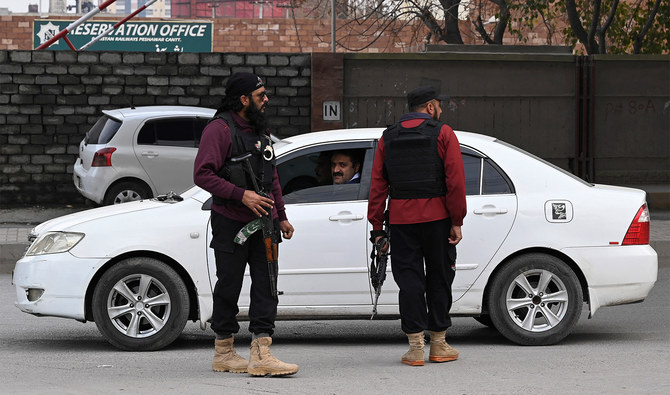
- Shakirullah Marwat was abducted near Bagwal on Saturday while traveling from Tank toward Dera Ismail Khan district
- Pakistan has seen resurgence of militant attacks in recent weeks, especially those targeting security and police personnel
PESHAWAR: A district and sessions judge who says he was kidnapped by Pakistani Taliban militants from the country’s northwestern Khyber Pakhtunkhwa (KP) province last week was recovered through a joint operation by police and security forces, police said on Monday.
Shakirullah Marwat was abducted near the town of Bagwal on Saturday while he was traveling from his hometown city of Tank toward Dera Ismail Khan district in KP. Pakistan has seen a resurgence of attacks by militants, especially those targeting security and police personnel, since 2022, when a ceasefire between the Pakistani Taliban, or TTP group, and the government broke down.
Security forces and police conducted two separate operations in Tank and Dera Ismail Khan districts after Marwat was abducted and killed six militants in an ensuing gunbattle, Regional Police Officer (RPO) Nasir Hussain Satti said.
“The judge was recovered in a joint intelligence-based operation on Sunday night,” Satti told Arab News.
“Forces choked all entry and exit points of the two restive districts, leaving no room for kidnappers to keep the judge with them. Finally, they had to set him free.”
Satti said the judge had been recovered without paying ransom or striking any kind of deal with the kidnappers.
Farooq Khan, Marwat’s relative who is also a lawyer, confirmed the judge had reached home on Sunday night.
In a brief video message released on Sunday ahead of his release, the judge said he had been kidnapped by the Pakistani Taliban, urging the federal and provincial governments and the chief justices of the Peshawar High Court and Supreme Court of Pakistan to meet the kidnappers demands and ensure his release. He did not specify in the video what the demands were and police declined to share details of the demands or the operation.
Shah Fahad Ansari, a high court advocate and divisional president of the Peoples Lawyers’ Forum, said the legal fraternity appreciated the “swift response” by police and security forces to ensure the judge’s recovery.
“But we demand authorities adopt all measures to ensure security in the province and discourage recurrence of these kinds of incidents in the future,” Ansari said.
Earlier this month, six including five customs department officials were killed in an attack in Dera Ismail Khan. Two customs officers were also killed in the area in a separate attack earlier.
Militants have also targeted security officials in KP in recent weeks, killing a number of police and counterterrorism department officials in targeted shootings.










